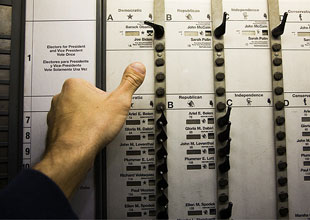The GOP has revived its perennial crusade against voter fraud, this time enlisting the tea party to root out (real or imagined) Election Day shenanigans, as I explain today. Democrats fear that the effort could end up suppressing votes or discriminating against voters likely to support them. But it looks like the conservative anti-fraud campaign has already had an impact on the elections by going after voter registration organizations—mostly notably ACORN, which dissolved last year amid allegations from the right that it promulgated massive voter fraud. Partly as a result, the Washington Independent notes, the number of new voter registrations has already dropped in a few states, especially in areas more likely to support Democrats:
Dramatically fewer groups are engaged in registering voters during the current election cycle than in previous midterm elections, and fewer voters, especially in poorer areas that are traditionally underrepresented…are registering to vote as a result.
Registration patterns vary significantly from state to state, but 26.7 percent fewer new voters have registered in Florida this year than in 2006, along with 21.4 percent fewer in Maryland and 16.9 percent fewer in Tennessee, according to the Brennan Center for Justice, a public policy and law institute at New York University. And while there’s no single cause for the decline, experts point out that many independent organizations are withering under a combination of public attacks by conservative activists alleging voter fraud and new state laws making it difficult for such groups to operate…
The most obvious cause for the decline in voter registration is the shuttering of the Association of Community Organizations for Reform Now, or ACORN… At its height, ACORN had a budget of close to $35 million and was credited with registering approximately half a million voters in 2008 alone.
A few new organizations have tried to step up registrations in urban areas like Houston since ACORN’s demise, but conservatives activists are working to quash them as well, making the same allegations of voter fraud. And Democrats could suffer as a result, as these new registration drives typically net young and minority voters—groups that the party is already struggling to bring back to the polls.













